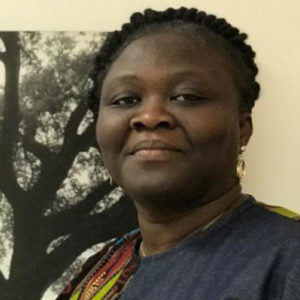
Morolake Odetoyinbo
Morolake (‘Rolake) Odetoyinbo is the founder and executive director of Positive Action for Treatment Access in Nigeria, and has advised the WHO on its HIV strategies. She sees “history repeating” with the unequal roll-out of COVID-19 vaccines, which means people in many countries might not access a vaccine for years. However, there is a solution – if only richer countries would stop blocking it.
This month – coinciding with World Vaccination Week and World Intellectual Property (IP) Day – behind closed doors, members of the World Trade Organization (WTO) held yet more discussions with pharmaceutical companies that could determine who gets access to a COVID-19 vaccine and how long they have to wait.
While some, mainly richer countries, are heralding their vaccination programmes a success, the WTO’s new Director General, Dr Ngozi Okonjo-Iweala, spoke out on the pandemic, calling it “morally unconscionable and a serious economic hit” that just 1.1% of people across Africa had received a vaccine – while in North America the rate was well over 40%.
Yet, after more long debates, the same countries that have the purchasing power to buy enough doses to vaccinate their populations twice over, are blocking an action that would afford all countries the same opportunity.
The action that must be taken is to waive intellectual property protections on all COVID-19 vaccines, medicines and related technologies and products – making wider, faster production around the world possible.
This was first proposed six months ago, and yet, while the world has climbed to the grim milestone of more than 3 million COVID-19 related deaths, the pharma industry’s interests are being protected, while everyone’s right to health is not.
“While you keep talking, people keep dying.”
While industry and trade representatives keep talking, others die. We said this during the AIDS crisis of the 1990s and we’re saying it again now.
Dr Okonjo-Iweala and I share the home country of Nigeria. She, like I, saw the same situation play out then as it is now. I was diagnosed with HIV in 1998 and most people living with HIV didn’t receive access to affordable treatment and care until 2005 when user fees were removed and routine monitoring became available to those on treatment. In other countries, treatment was available for people in the 1980s and 90s. Three years even before my diagnosis, in 1995, a new era of treatment was beginning with the approval of a new highly active antiretroviral treatment (HAART), which once incorporated into clinical practice brought about about an immediate decline of between 60% and 80% in rates of AIDS-related deaths and hospitalisation in those countries which could afford it.
“Private companies control supply of medicines and vaccines – in sub-Saharan Africa, only now are life-expectancy rates approaching the levels that they were prior to HIV – what effect will COVID-19 have on this?”
HIV had a huge impact on life-expectancy across sub-Saharan Africa. There was a huge drop around 1990, which coincided with the rise of HIV, and life expectancy is only now approaching levels prior to the HIV epidemic.
A small handful of pharmaceutical companies controlled the world’s supply of HIV treatment. The decisions made by private companies directly contributed to the number of deaths.
“Continuing to block this action implies that those in lower income countries have less of a right to survive.”
We’re in the same situation now with COVID-19 vaccines. We do not have enough doses for everyone. Nigeria only has doses for 20% of its population. Pharmaceutical companies will not voluntarily relinquish control, so WTO members need to agree to the waiver to make it mandatory. Continuing to block this action implies that those in lower income countries have less of a right to survive.
“It’s not just immoral, but also illogical to not insist on an equitable, global solution.”
It’s not just immoral for countries to purely ‘look after their own’, it’s also illogical and goes against what scientists know about how the virus mutates. Unequal vaccination increases the chances for vaccine-resistant variants to develop and travel around the world. A country-by-country approach might not protect anyone in the long run.
Dr Okonjo-Iweala has proposed what’s been described as a ‘third way’, as an alternative to the waiver. However, this keeps the same system in place, and relies on voluntary measures and charity. Voluntary measures initiated back at the start of the pandemic intended to ensure equal access are failing. They place the pharmaceutical industry in the role of benefactor, a role which isn’t rightfully theirs to step into when vaccines were developed with the support of huge public investment.
“There can be no compromise – lives depend on it.”
The only real way to ensure fair access is to support the waiver. This is the ‘people’s way’. We can’t afford to delay any longer. Now is the time to use our voice, to show world leaders that we demand action. As Dr Tedros Adhanom Ghebreyesus of WHO put it at the World Bank’s #Vaccine4All event: “The mother of all bottlenecks is lack of political will and weak global solidarity.” We must demand they put lives before profits – there can be no compromise.




